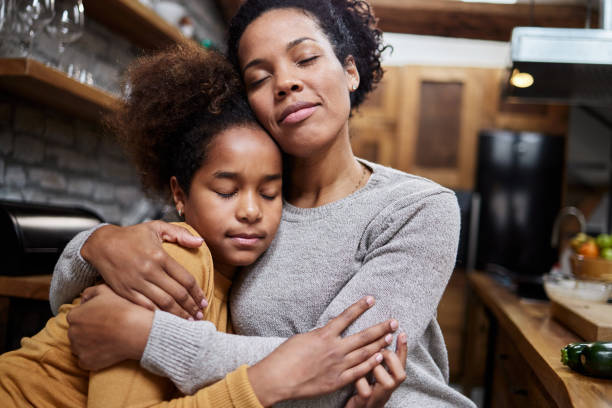
More than 20 percent of youth suffer from depression. Sad kids don't always have depression, but if your child's mood prevents them from enjoying activities or has additional symptoms like irritation or fatigue for weeks, it's crucial to get treatment. Discuss with your child's doctor or mental health practitioner. Therapy or medication for childhood depression usually works.
RELATED: How to Help a Child in Depression: 8 Pieces of Advice
Can Children Have Depression?
Yes. Adults don't recognize kids might be depressed. Depression wasn't considered a pediatric disorder until the mid-1980s. We now know that newborns and 2-year-olds can have depression. It's a terrible, treatable sickness.
Depression affects males and girls equally before puberty, while girls have double the risk thereafter. Adolescent depression is more prevalent than in younger children. In 2019, 20 percent of 12-to-17-year-olds experienced a significant depressive episode, 36.7 percent were sad, and 18.8 percent pondered suicide.
Since the COVID-19 pandemic, depression rates have increased considerably. Social isolation, school closures, missed milestones, and family stress contribute. Depression was second only to anxiety at 28 percent in a 2020 worldwide mental health study of children aged four through 19. Researchers examined 35 surveys involving almost 65,000 youngsters.
Another study found that 25 percent of kids worldwide are depressed. Later pandemic investigations, older children and females had worse symptoms. In 2020, U.S. youth suicide attempts increased 31 percent. Those numbers keep rising: Girls aged 12-17 had 51 percent more suicide attempt Emergency Department (ED) visits in February and March 2021 than in 2019. Suicide attempt ED visits increased 3.7 percent for boys.
If My Child Is Sad A Lot, Does This Mean They Have Depression?
No. It's hard to discern whether your child's conduct is normal or abnormal. Everybody—even kids—gets depressed or sad sometimes. Depression isn't sorrow. Clinical depression goes beyond a child's occasional melancholy. The illness causes despondency and a lack of energy and excitement for weeks, months, or even years.
Depressed children are gloomy or irritated for weeks and no longer enjoy activities. Even minor depression affects a child's ability to perform at home, school, and with friends. Identifying and seeking assistance is crucial. Early identification and therapy may help your kid feel better and reduce their risk of depression.
Talk to your child's doctor about depression screening and if their conduct is concerning. They may send you to a child psychologist, psychiatrist, or another kid-focused mental health specialist.
RELATED: 10 Ways Protect Your Child’s Mental Health
What Are The Signs & Symptoms
Children's depression symptoms vary from adults. Children have more physical symptoms and less emotional expression. Depression might change your child's behavior. These include:
- Often crying
- Unpleasantness, irritability,
- Physical agitation like fidgeting or hyperactivity
- Rage
- Fluctuations
- Disinterest in former hobbies
- Conflict among siblings and relatives
- Avoiding friends and extracurriculars
- Isolation
- Fatigue, lethargy, and
- Sleeplessness
- Weight and appetite changes
- Inattention
- Self-doubt and guilt
- Hopelessness
- Preoccupation with death, suicide, or self-harm (verbally, in conduct, or in play)
- Poor school performance or disinterest in school
- Frequent headaches, stomachaches, and other bodily issues
***Note: Call the doctor if you think your kid could damage themselves or others.
RELATED: Depression in Black Children: What Does It Look Like?
What Causes Childhood Depression?
Biology and the environment create depression. Depression is linked to brain chemistry, particularly chemical neurotransmitters that send signals between nerve cells. Decreased neurotransmitters may cause depression and other mental illnesses by disrupting brain function. Depression risk rises if a parent experiences depression as a youngster. Depression might also be caused by other factors. Environmental depression risk factors include:
- Early childhood neglect, abuse, or abandonment
- Stress from family strife, financial issues, persistent school issues, or a tough relocation
- Losing a friend or pet
- PTSD (physical or emotional)
- Other learning, behavioral, or psychiatric issues (Depressed children may also have anxiety, ADHD, behavioral disorders, eating disorders, or drug misuse issues.)
- Chronic illnesses
RELATED: It’s Okay Not To Be Okay: 7 Tips For Talking To Your Child About Depression
How To Treat Depression In Kids
Helping your depressed child is crucial. Depressed kids may skip school, lose friends, and miss activities. Depression increases the chance of drug use, teen suicide, and misbehavior. Depression is curable. Therapy usually works for mild depression. Medication and psychotherapy are frequently suggested for severe depression that doesn't improve with treatment.
- Therapy. Cognitive Behavioral Therapy (CBT) and Interpersonal Therapy (IPT) are effective depression treatments. Play and parent-child therapy may help two through six-year-olds.
- Cognitive behavior therapy. Most children with depression get CBT. CBT helps kids to replace negative ideas with positive ones that make them feel better. It can teach kids self-control and problem-solving. CBT's play therapy may help younger, less vocal children express themselves.
Group treatment, family therapy (including the kid, parents, and siblings), and parent counseling may also be recommended. Group treatment involves less than 10 youngsters with comparable issues.
- Interpersonal therapy. IBT emphasizes interpersonal interactions. The therapist helps a youngster enhance family and friend connections via talking and role-playing. IBT may assist a youngster who is grieving, in conflict with significant people, having issues adjusting to life changes, or is socially isolated. IBT may incorporate family, parent, play, and group therapy like CBT.
- Antidepressants. Antidepressants may rectify a chemical imbalance that causes depression, but they don't always work. Concerns include side effects. For mild to moderate depression, experts suggest treatment before medications. Some mood-boosting drugs might cause suicidal thoughts and attempts in children and young people under 25.
Medication may hide a child's depression and prevent successful therapy. A youngster who's depressed due to family conflict or teacher disagreement might benefit from a shift in the setting.
However, safe antidepressants for children outweigh the hazards. Discuss antidepressant dangers and advantages with your child's doctor and closely monitor them if they're on them. You, your kid, and their doctors should decide on medicine together.
Your child's doctor will usually prescribe one medicine, work with you to see whether it's working, and monitor side effects. Your child's doctor may change medications or doses based on their reaction. Medication might take weeks or months to work.
Selective serotonin reuptake inhibitors (SSRIs), including fluoxetine (Prozac), citalopram (Celexa), escitalopram (Lexapro), fluvoxamine (Luvox), paroxetine (Paxil), and sertraline (Zoloft) are the most used antidepressants for children (Zoloft). If your kid doesn't react to an SSRI, their doctor may prescribe bupropion (Wellbutrin), desvenlafaxine (Pristiq), or duloxetine (Cymbalta).
Depression may be persistent; therefore, children need support learning coping skills. Even when youngsters need medicine, experts recommend counseling. Antidepressants won't fix the issue; therefore, kids on them need continuous supervision.
RELATED: How Stress and Gastro Issues Affect Kids With Autism
How To Find A Mental Health Professional For Your Child
Consult your child's doctor, other doctors, family, school counselors, and friends. They may recommend someone they trust. Online tools like:
- The American Academy of Child and Adolescent Psychiatry provides Child and Adolescent Psychiatrist Finder in your area.
- The American Psychological Association has a Psychologist Locator where you may find a psychologist by region and specialty.
- Anxiety & Depression Association of America provides a Find a Therapist Directory.
- The Association for Behavioral and Cognitive Therapies gives a CBT Therapist Directory to discover cognitive-behavioral psychologists, psychiatrists, and clinical social workers.
- Psychology, Today's website offers a Find a Therapist connection to local mental health providers.
Medicaid, the Children's Health Insurance Program, and most other insurance plans include mental and behavioral health care, although benefits vary. Ask your insurer about your coverage and out-of-pocket payments. Once you have a few names, ask them background questions like these:
- Are you licensed?
- What are your degrees?
- Are you board-certified?
- Practiced timeline?
- Your specialty?
- How do you treat?
- Treatment duration?
- Fees? Accept my insurance? Is your charge sliding? Can you arrange payment?
If your kid has another mental health issue connected to depression, such as attention deficit disorder or an eating disorder, see a specialist.
Finally, you and your kid should like the caregiver. Find a child-friendly talker. Before bringing your kid to a session, you might call or visit with possible therapists. If a therapist doesn't seem right, try another. Depressed children are hard on parents too. Self-care and asking for assistance are important.
RELATED: Children and Mental Health: What You Can Do to Help Your Child?
How To Help Your Child With Depression
Depressed kids need help. Be kind and patient. Listen without judgment when your youngster wants to speak. Encourage them to express their emotions, including death and suicide anxieties. Trust them and embrace competent aid. Help your youngster relax:
- Reduce chores and extracurriculars.
- Ask instructors to reduce your child's schoolwork.
- Social media may expose your youngster to harassment and bullying. Set social media rules and implement parental controls.
- Find enjoyable things to do with your kid or their pals. Build on your child's abilities and interests.
- Encourage awareness and relaxation.
- Routines may boost security and control.
- Break down problems to help people solve them.
Help them stay healthy by:
- Healthy eating: Staying active. Exercise reduces depression and improves mood. Fun, rewarding, and connecting activities are best.
- Good night's sleep: Contact your child's therapist often for support tips. Make sure your youngster takes their medicine. Be alert of side effects and indicators that your kid needs immediate attention.
RELATED: How Allowing Our Kids to Express Themselves Can Improve Their Mental Wellness as Adults
What To Do If Your Child Talks About Suicide
Take your kid to the emergency room if they're suicidal or self-harming.
Many kids from all backgrounds commit suicide. Suicide is the second highest cause of mortality for 10- to 24-year-olds (after accidents) and the sixth for five to 14-year-olds. Suicidal kids and teens frequently have serious mental illnesses, mainly depression.
Teens who attempt suicide face stress, self-doubt, despair, and loss, whereas younger children, who act impulsively, face grief, bewilderment, and fury.
Suicide risks:
- Family trauma, such as abuse and violence, suicide of a family member, separation from loved ones, and loss of stable housing
- Previous suicide attempts. Self-harm (such as cutting) also increases the risk of suicide.
- Hostility and rejection related to sexual orientation or gender identity
- Racism
- Depression and other mental health conditions, such as eating disorders and mood disorders
- Substance abuse
- Behavior issues, such as extreme anger, aggression, or impulsivity, especially when socially isolated
- Knowing about the suicide of someone the child knows, especially if it's a family member, friend, or peer
- Easy gun access. Guns are the main cause of suicide for teens.
- Bullying. According to a study of more than 96,000 children and adolescents, those bullied online were about 12 times more likely to have suicidal thoughts than those who weren't. The risk for self-harming and suicide attempts is also significantly higher for cyberbullied children.
In addition to the steps you can take to help your child with depression (above) if your child talks about suicide, the following can help:
Don't believe they're "just being theatrical" or overreacting when they remark, "Nothing matters" or "I want to die." A youngster needs treatment if they say these things.
- Communicate. If you think your kid is sad, ask them. Say you care about how they're feeling and want to discuss. If your youngster says, "There's nothing to live for," demonstrate you understand and sympathize. Instead of "I can't believe you think that," say, "It seems like you're genuinely suffering if you're thinking of ending your life." They need to know they can speak to you about suicide, so don't hesitate to inquire.
- Positively accept assistance. Your youngster can get therapy for depression. Explain that taking care of their mental health shows maturity and self-respect to alleviate shame or embarrassment. Explain that many individuals deal with mental health issues. Be patient with them. They may feel better with patience and the correct therapy.
- Hire a pro. Ask a mental health expert or your child's doctor for assistance. A mental health specialist may treat your kid with counseling and medication and help you both build a plan to deal with suicidal thoughts, including coping techniques, sources of support, measures to do if the situation worsens, and emergency contacts. Put the suicide hotline number on your child's phone.
- Protect your youngster. Ensure your kid cannot access harmful prescriptions, alcohol, tools, knives, firearms, other weapons, illegal substances, potentially toxic goods (such as home cleansers and antifreeze), ropes, belts, or plastic bags.
Where Can I Learn More About Childhood Depression?
For more information about depression, treatment, and support services, visit the websites of these organizations:
American Academy of Child & Adolescent Psychiatry
American Psychiatric Association








